Sharing Experiences in Nurturing Young Talents into STEAM Disciplines, Especially Circuits and Systems Fields
I. New Challenges in 21st Century
College students in the 21st Century are immersed in a very new environment than that in the 20th Century. Thus, their behavior is quite different from before. First of all, portable electronic devices such as smart phones are very popular and powerful. A lot of useful information, including cross-disciplinary textbook knowledge, can be easily obtained via Internet using smart phones. Second, artificial intelligence (A.I.) has been proven to be successful in many practical applications. For example, AlphaGo-series software from Google Inc. has beaten human experts in competition straight for several times.
Young students are very concerned that many existing jobs in industry could be replaced by A.I. systems in the next several years. Therefore, the number of high school students who are interested in science and engineering fields has steadily declined. Their interests are shifted toward the service sector, where knowledge in humanity and social sciences can be advantageous. This phenomenon occurs worldwide, not only in U.S.A., Europe, Japan, but also in Taiwan, Korea, Singapore, and many other places.
In order to help recruit young students to increase their interest in S.T.E.A.M. disciplines (science, technology, engineering, art, and mathematics), we systematically organize seminars at top-tier high schools, first experiments are carried out in Taiwan.
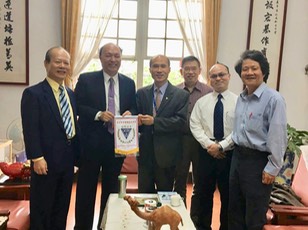
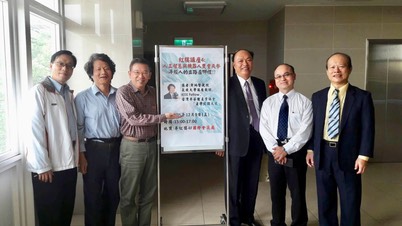
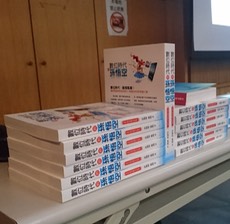
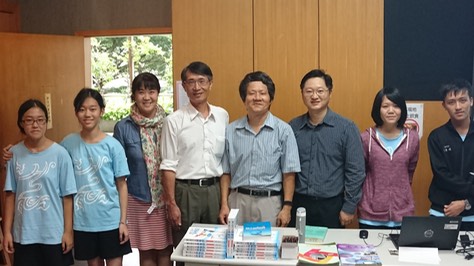
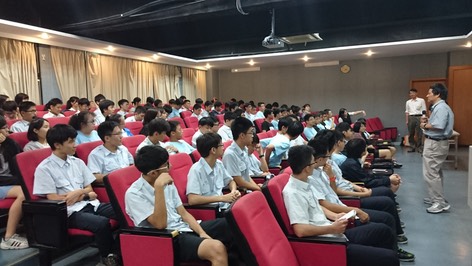
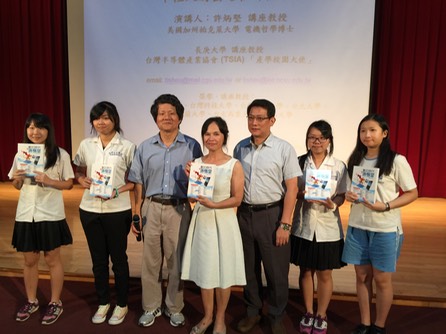
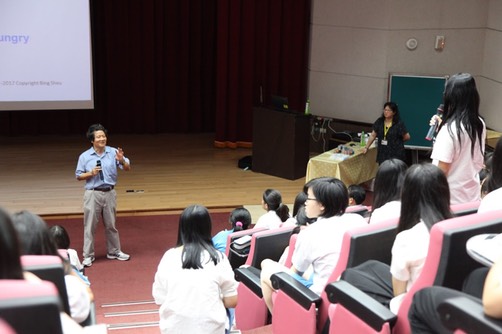
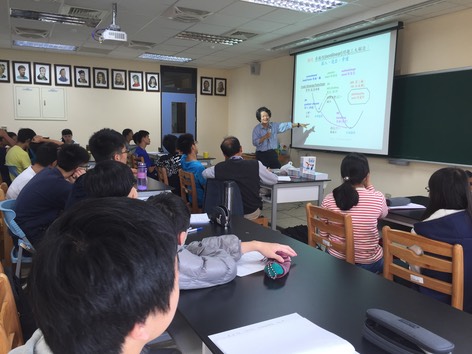
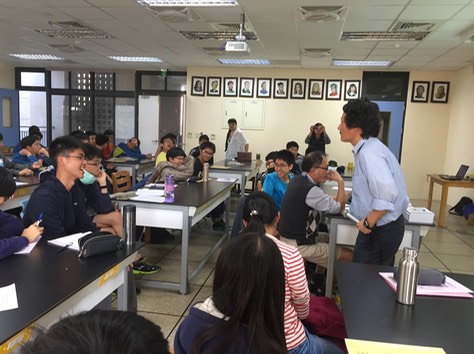
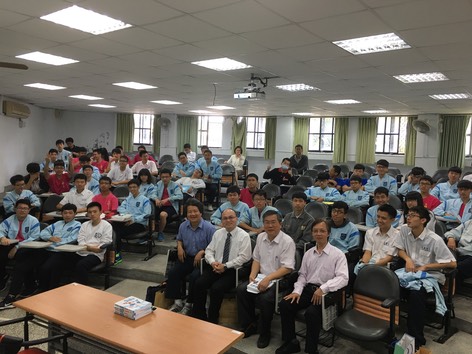
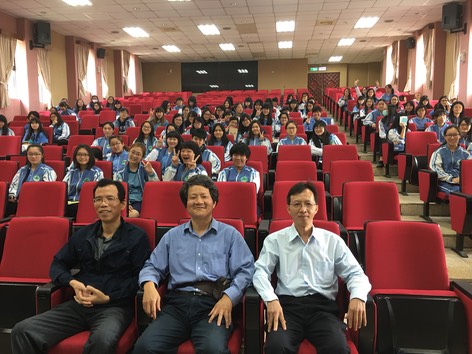
PHOTOS (Topdown, left to right): 1. The team visited the principal office of Taipei Municipal Jianguo High School and exchanged the school flags. 2. At Taipei Municipal Jianguo High School, the visit team took group photo next to the seminar poster. 3. Donation of 20 copies of the book: “Monkey King in Modern World”. 4. At Affiliated High School of National Taiwan Normal University, the visit team took group photo with the host teacher and representative students. 5. At Affiliated High School of National Taiwan Normal University, the seminar was attended by more than 120 students. 6. At Taipei Municipal Zhong Shan Girls’ High School, the visit team took group photo with school principal and student representatives. 7. At Taipei Municipal Zhong Shan Girls’ High School, many students asked very stimulating questions. 8. At National Experimental High School at Hsinchu Science Park, Professor Bing Sheu explained key properties of nonlinear problems. 9. At National Experimental High School at Hsinchu Science Park, students asked fascinating questions. 10. At I-Lan High School, the seminar was attended by students with diverse interests. 11. At Lan-Yang Girls’ High School, some students are eager to enter nursing program.
II. Inspiration Seminars
Taiwan Semiconductor Industry Association (TSIA) consists of vigorous member companies covering a broad spectrum of semiconductor technology: from silicon manufacturing, to IC chip design, and module packaging & testing. The Board of TSIA appointed Chair Professor Bing Sheu to serve as “Campus Ambassador” and to deliver seminars at top-tier high schools in Taiwan in both 2016 and 2017.
II.A Taipei Municipal Jianguo High School
The visit to Taipei Municipal Jianguo High School took place in December 2016. This school is located in Taipei City and generally regarded as number one in Taiwan for the male students. Many students are talented in various ways. The talk is listed under Principal’s Distinguished Seminar Series.
First, we visited the school principal office and exchanged memorable gifts such as school flags (Photo-1). Next, the visit team took group photo besides the large seminar poster before the talk (Photo-2). The whole seminar lasted for about 2 hours. In the beginning, school principal Hsu gave opening remark and presented appreciation certificate to the seminar speaker, Professor Bing Sheu. Next, Provost Ouyang of Chang Gung University expressed enthusiasm in facilitating interaction with high school students. Then, Engineering College Dean Lai used ten minutes to highlight the attractive features of modern engineering education to the students.
The main talk is entitled: “With the increasing competition from AI and intelligent robots, what will be a wise strategy for the youth to prepare for the future?” First, a unified view toward the whole Universe is presented. Students are guided to maneuver through the 4-dimensional space-time combination, not to be restricted to narrow sense of current time. A clear big picture to comprehend what were important from the past and what will become prominent in the future is critical to the students.
Since intelligent machines will be very efficient in generating correct answers for equality questions, the students are inspired to expand their scope to deal with inequality problems or even uncertainty problems. That is to say, try their best to stay ahead of the capabilities of the intelligent machines.
During the Q&A (question and answer) session, students were eager to ask creative questions. The visit team prepared small gifts for those students who asked the questions. Overall, it was a very successful seminar event in motivating a large number of high-school students to get further into S.T.E.A.M. track to prepare for the college study.
PHOTOS. Top-left: At Taipei Municipal Zhong Shan Girls’ High School, many students asked very stimulating questions. Top-center: At National Experimental High School at Hsinchu Science Park, Professor Bing Sheu explained key properties of nonlinear problems. Top-right: At National Experimental High School at Hsinchu Science Park, students asked fascinating questions. Bottom-left: At I-Lan High School, the seminar was attended by students with diverse interests. Bottom-right: At Lan-Yang Girls’ High School, some students are eager to enter nursing program.
II.B Affiliated High School of National Taiwan Normal University
The visit to Affiliated High School of National Taiwan Normal University took place in October 2016. This school is located inside Taipei city and generally regarded as among top-5 best senior high schools in Taiwan. It admits both male and female students.
The visit team donated 20 copies of the book: “Mighty Monkey King in Modern World” (ISBN: 9789869292504) which teaches the students how to become versatile and flexible in order to deal with new challenges in Information Age (Photo-3). The book is written by Professor Bing Sheu, with sponsorship from TSIA (Taiwan Semiconductor Industry Association). Many famous scholars provided stimulating prefaces for the book. The visit team took group photo with the host teacher and representative students (Photo-4).
The seminar was attended by more than 120 students with science and engineering emphasis (Photo5). The students are fascinated by the thoughts that inspire them to go beyond existing thinking boundary, and to strengthen creativity ability and to broaden the horizon.
II.C Taipei Municipal Zhong Shan Girls’ High School
The visit to Taipei Municipal Zhong Shan Girls’ High School took place in the second half of October 2016. This school admits only female students.
We were warmly received by the school principal Wu who took picture with us and the student representatives (Photo-6). The seminar was attended by students from 3 grades: 10th, 11th, and 12th. Most of them are highly interested in science and engineering disciplines. During the Q&A session, many students asked very stimulating questions (Photo-7). For example, which approach is better: to study abroad or to stay in Taiwan for the college degree? How to exercise proper balance between work and life? Once again, the visit team prepared small gifts to those students who asked the questions.
II.D National Experimental High School at Hsinchu Science Park
The visit to National Experimental High School at Hsinchu Science Park took place in December 2016. This school is very special and quite new. The per-student funding is much higher than that in an average high school and approaching to the university level or even higher. The student-teacher ratio is pretty low. Many graduates from this experimental high school went abroad to pursue advanced degrees.
During the seminar, Professor Bing Sheu explained key properties of nonlinear problems and the associated local optimum versus global optimum solutions (Photo-8). At the Q&A session, students asked very tough questions, such as how to achieve real magic, not just as a magician? (Photo-9) To them, engineering is truly a magic that new products are steadily invented or created to change our lives and work styles.
II.E I-Lan High School and Lan-Yang Girls’ High School
The visit to I-Lan High School and Lan-Yang Girls’ High School took place in April 2017. Both schools are located in I-Lan city which is in the east coast of Taiwan. The former admits male and female students, while the latter admits only female students. Life in I-Lan city is more relaxed than that in Taipei city.
After the undergraduate study, Professor Bing Sheu spent about 2 years in I-Lan city to perform military service as a second lieutenant in an arsenal. Thus, I-Lan city is indeed a second hometown. Similarly, Engineering College Dean Lai was originally from I-Lan city. Visit to these two high schools is like home-coming to him.
Both seminars were attended by enthusiastic students who are eager to know: What subjects to study in the college in order not to be overwhelmed by the mighty A.I. (artificial intelligence)? Is the existing university structure the most suitable way to deliver knowledge to the youth? (Photo-10 and Photo-11)
Summary
In the 21st Century, universities worldwide need to put in significant amount of efforts to help attract talented students to the STEAM disciplines, especially the circuits and systems fields, in order to continue and sustain the remarkable advancement of engineering for better human lives.
Note: Dr. Bing Sheu is a Chair Professor at Chang Gung University in Taiwan. He taught at USC during 1985 – 1998, worked as R&D Director at Synopsys Corporation during 1999 – 2006, and at TSMC during 2006 – 2015. He served as President of IEEE Circuits and Systems Society in 2000, as Editor-in-Chief of IEEE Transactions on VLSI Systems in 1997 & 98, and as Founding Editor-in-Chief of IEEE Transactions on Multimedia in 1999.
At Chang Gung University, Prof. Pin Ouyang serves as Provost, Prof. Chao Sung Lai serves as Dean of Engineering College, and Prof. Kou-Chen Jacob Liu serves as Chair of Electronics Engineering Department. At National Chiao Tung University, Chair Prof. Peter Chung-Yu Wu is ex-President of the University, and Prof. Shyh-Jye (Jerry) Jou is ex-Dean of International Affairs.
References:
1. Bing Sheu, San-Liang Lee, Poki Chen, Peter Wu, Liang-Gee Chen, Soe-Tsyr Yuan, Shou-Yan Chou, “Sharing Experiences from Forum on “Global Talents Competitiveness in Man / Machine Symbiotic World,” IEEE Circuits and Systems Newsletters, vol. 6, no. 3, June 2012.
2. Bing Sheu, Liang-Gee Chen, Peter Wu, Shou-Yan Chou, Sally Tsai, “Sharing 2010 Experiences on High-Tech Academic Mentoring in System-on-Chip Field,” IEEE Circuits and Systems Newsletters, vol. 5, no. 1, Feb. 2011.
Beng Sheu, Pin Ouyang, Chao Sung Lai, Peter Chung-Yu Wu, Chang Gung University, Taiwan, and Shyh-Jye (Jerry) Jou, Kou-Chen Jacob Liu, National Chiao Tung University, Taiwan